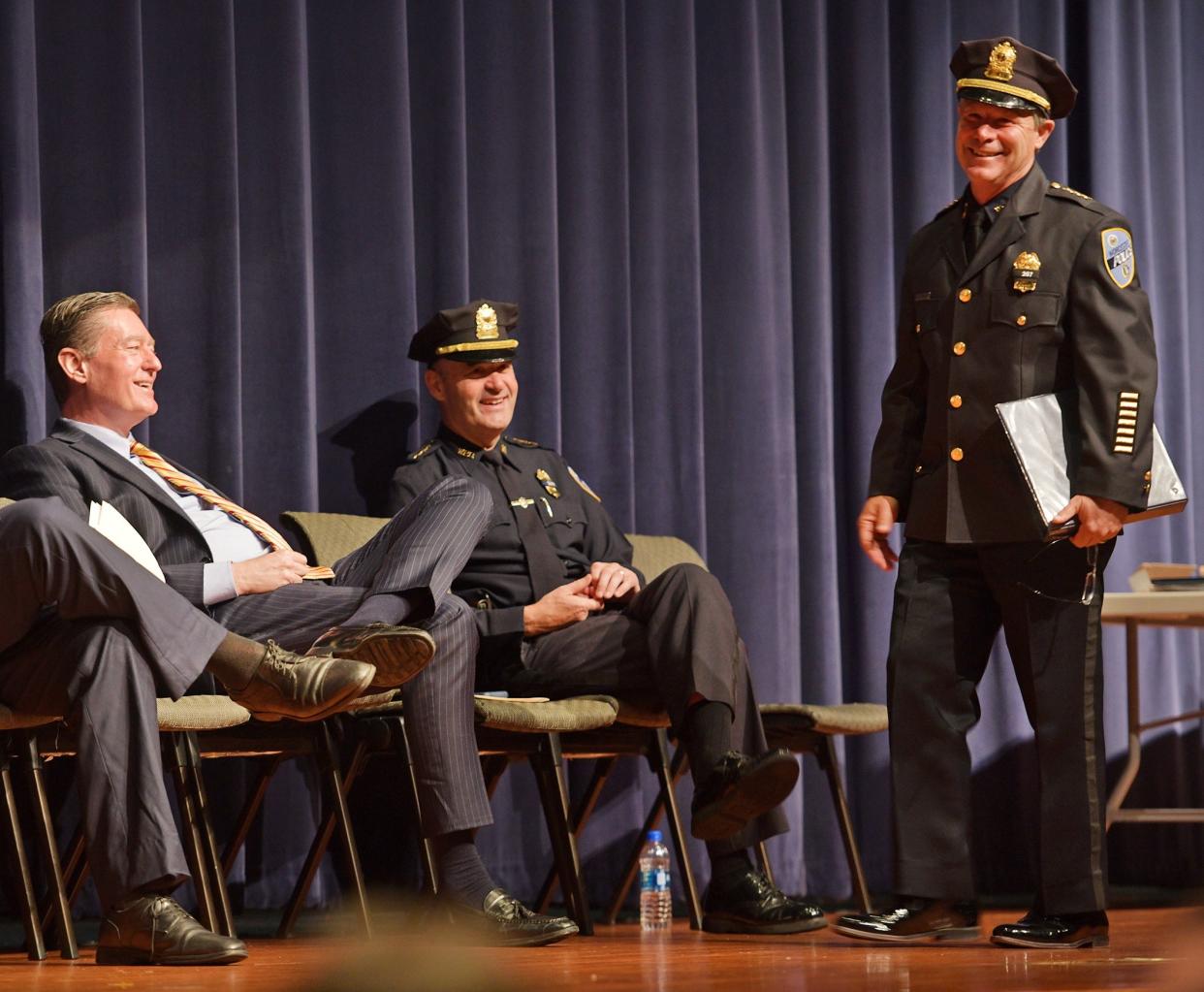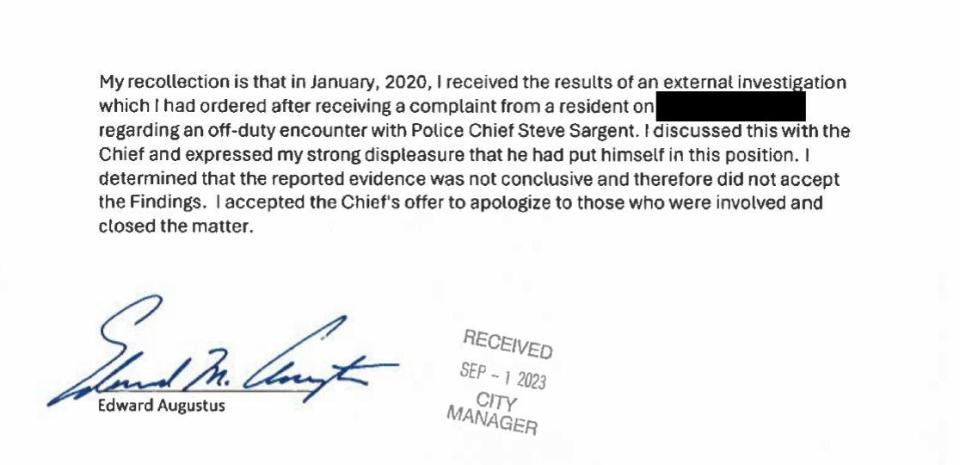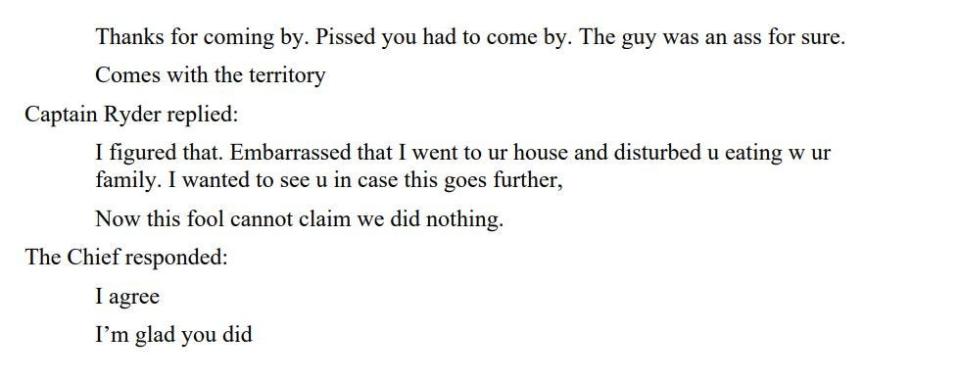Former Worcester City Manager Augustus shelved investigation that implicated police chief

WORCESTER — Former Police Chief Steven M. Sargent was untruthful about a 2019 driving dispute in which a city resident claimed Sargent had been drinking, an independent investigator ruled in a 2020 report whose conclusions were disregarded by then-City Manager Edward M. Augustus Jr.
“I find that Chief Sargent engaged in conduct unbecoming … (by) entering onto the property of a private citizen for no lawful purpose and then berating that citizen using vulgar language and insults,” Michael P. Gardner, former director of personnel and labor relations for the City of Cambridge, wrote to Augustus in January 2020.
In a 58-page report, Gardner found that Sargent was untruthful and that he and two other police officials – including newly appointed interim Chief Paul Saucier ‒ had acted improperly after the resident complained.
“It is especially important to follow procedures in extraordinary cases, where suspicions might run high that the department would be tempted to ignore procedures, and not investigate as required, in order to protect their own,” Gardner wrote. “That appears to be what happened in this matter, potentially undermining citizen confidence in the integrity and thoroughness of investigations, particularly those at the highest levels.”
The city released the investigation to the T&G Sept. 5, one business day after Sargent abruptly retired.
More Batista pledges police transparency, says reporting hastened chief’s retirement
The city also released a signed statement from Augustus, which it stamped as being received Sept. 1, the day of Sargent's exit. In the statement Augustus, who is now the state's housing secretary, wrote, “I accepted the Chief’s offer to apologize to those who were involved and closed the matter.”
The city released the statement and Gardner’s investigation pursuant to a public records request the newspaper filed July 30, seeking all investigations into the chief since 2019.
In his four-sentence statement, Augustus wrote that it was his “recollection” that, after ordering an independent probe into the complaint, he “determined that the reported evidence was not conclusive and therefore did not accept the findings.”

The statement did not provide any details about why Augustus believed the findings of the investigator he hired were unsupported.
Augustus declined to comment when approached by the T&G at the Statehouse Tuesday and declined to answer a set of detailed questions sent to his office.
Gardner, who served as Cambridge’s labor chief for 28 years, told the T&G Wednesday that no one from the city had reached out to him to follow up on his report, something he said was not unusual in consulting.
Asked about his findings, he said he believed they had "substantial evidence behind them."
City Manager Eric D. Batista declined an interview request lodged Tuesday. He declined to say when he learned of the investigation or from whom, with a spokesperson saying that it was discovered by a person in the human resources department who he declined to name.
William Bagley, the city's current director of human resources, was interviewed by Gardner as part of the investigation in 2019, the document shows, when he was a lawyer there.
Efforts to reach Sargent through his lawyer, Austin Joyce, were unsuccessful.
More “Embarrassing:” Councilors Haxhiaj, King say scrutiny warranted after police chief’s exit
'That is no way for a police chief to act'
According to Gardner's report, the complaint began with a call placed to the department’s recorded nonemergency dispatch line at 7:05 p.m. Sunday, Sept. 22, 2019.
“I want to make a complaint against the Chief of Police,” a man whose name and address were redacted from the report told dispatch, according to a transcript of the call affixed to the report.
While the man’s address was redacted from the report, the T&G was able to independently verify that the incident took place on Drummond Avenue.
The man told the dispatcher that he and Sargent had exchanged beeps while the man was helping his wife park her car in their driveway, and that Sargent had exited his vehicle.
“He gets out of his car and he was absolutely hammered. I could smell it a mile away,” the man said. “Gets in my driveway, gets in my face. Calling me names, with my kids in the driveway.
“That’s bullcrap, chief of police doing that,” he added. “Now I don’t know what I have to do to make a complaint.
“I’ll go to the Worcester Telegram if I have to but that is no way for a police chief to act.”
The transcript shows that a dispatcher, after placing the man on hold twice and consulting with multiple police officials, told him someone would come to his home to speak with him.
That never happened, Gardner, wrote. Instead, a police captain who knew Sargent for decades placed a call to the man and hung up without leaving a message before going to Sargent’s home. While apologizing to Sargent for bothering him, the captain determined he was not drunk.

“Thanks for coming by. Pissed you had to come by. The guy was an ass for sure,” Sargent texted the captain, John J. Ryder Jr., later that evening, the investigation found.
“Embarrassed that I went to ur house and disturbed u eating w ur family,” Ryder replied. “I wanted to see u in case this goes further, Now this fool cannot claim we did nothing.”
Efforts to reach Ryder, who retired in August 2022 after 35 years with the police department, through the department and the police officials’ union were unsuccessful.
'Half-hearted effort' to talk to complainant
Gardner pointed to the texts as one of multiple pieces of evidence that showed police had failed to adequately investigate the complaint in violation of their own policies.
The texts showed "great prejudice" against the man, he wrote, less than 90 minutes after Ryder had accepted responsibility to investigate the complaint.
Gardner wrote that Ryder’s boss at the time, Deputy Chief Saucier, “failed to give adequate direction to his subordinate Captain to ensure that the complaint was adequately investigated, reports prepared, and the matter referred to the Bureau of Professional Standards [the city’s internal affairs unit].”
Gardner wrote that police violated a department policy requiring the department to give anyone who makes a complaint the opportunity to file a written statement and to forward the complaint along to internal affairs.
“[Ryder’s] half-hearted effort to reach the complainant, by placing one telephone call, without leaving a message, and then with no follow-up, as well as his statements to the investigator, make clear he had no intention to thoroughly investigate the complaint,” Gardner wrote.
Gardner said Saucier told him he had suggested Sargent give Augustus a “heads up” about the complaint and that Sargent replied to him that it was “all set.”
“In his interview, the Chief said he did not recall Deputy Saucier saying that to him,” Gardner wrote.
Saucier declined an interview request. Asked several questions about the report, a police spokesperson deferred comment to Batista’s office.
No field sobriety test
Gardner noted in his report that Ryder did not tell him about the text exchange he had with Sargent during his initial interview.
He concluded that Ryder appeared to have done “the absolute minimum" possible, saying Ryder appeared to have known little about what the caller had alleged to have happened.
“He declined to do even a basic field sobriety test. He did not inquire as if or when the Chief had had anything to drink,” Gardner wrote, adding that Ryder instead determined from his own observations that Sargent was sober.
Gardner wrote that it was unclear exactly what time Ryder and Sargent spoke, but that it could have been up to 90 minutes after the incident on Drummond Avenue.

Out for a bottle of wine
According to Gardner’s report, Sargent reported the incident had occurred after his wife asked him to grab some food and wine for company.
Sargent went out while he was cooking ribs on the grill, Gardner wrote, leaving in his unmarked, blue Ford Taurus that had a fully functioning police radio but whose lights and siren “were malfunctioning and needed to be serviced.”
Sargent told Gardner he had “maybe two” beers earlier in the day while cooking, but that was it.
The chief told Gardner he was driving down Drummond Avenue ‒ which has a steep decline – at about 5 to 10 miles per hour when he saw a car backing up in the right-hand lane.
The chief said he gave a “quick beep” to “alert the other driver” and stopped closely behind the car, which also stopped.
Gardner said the chief told him the car in front of him didn’t move or signal for about a minute, so he beeped a couple more times.
“He said he ‘didn’t lay on the horn but hit the horn a couple of times,’” Gardner wrote. “In his second interview he said, ‘I really beeped.’”
Gardner said Sargent reported following the vehicle in tandem as it moved slowly toward the driveway, saying at one point it stopped abruptly, as if the other driver “stopped quickly to bust my chops.”
Sargent told him that after the man got into his driveway, he lowered his passenger’s side window and yelled, “You almost hit me two times."
At that moment, the chief alleged, the other driver, whom he referred to as a “bully,” started “barreling” down the driveway toward the Taurus.
“The Chief said he reacted with his police training, instinctively getting out of his car and approaching the other driver, who was still coming toward him.
“I got out of the car to yell; he was moving at me,” Gardner quoted Sargent as saying. “It was just a reaction, like a cop. You get out of the car and try to move them back."
Sargent told Gardner the men swore at each other. He painted the other man as the aggressor and said he got back in his car and left after he saw the man's wife.
Sargent told Gardner that as he walked away, the man yelled at him repeatedly, accusing him of being drunk.
He reported being “embarrassed” for getting out of the car, saying a “cooler head” made him leave.
Gardner wrote that the chief “agreed that the man never got so close to the car that the Chief would have been hampered in any way in just driving away.”

Witnesses found more credible than chief
Gardner wrote that the man involved in the incident, his wife and their neighbor all gave interviews that conflicted with Sargent’s recollection and were more credible.
All three labeled Sargent as the aggressor, wrote Gardner, and denied that the man had yelled that Sargent was drunk as he was driving away.
Gardner said he did not believe Sargent was aware a neighbor had witnessed the incident when he gave his interview.
The woman, Gardner wrote, was a 64-year-old retired correctional officer who has a license to carry a firearm – licenses which are approved and revoked by police chiefs.
Gardner wrote that the woman recalled seeing the Taurus come to a quick stop, seeing Sargent "jump" out and seeing him "jumping up" in her neighbor's face while calling him a "fat ass.
“She said the man was very aggressive, ‘almost as if he wanted [her neighbor] to hit him,’” Gardner wrote.
Gardner found that, "contrary to his claim, it was the chief who was the primary aggressor in initiating the face-to-face confrontation."
He found there was not enough evidence to say whether Sargent was drunk, writing that the man "never claimed" Sargent was drunk during in their interview, though he did say he was "1000% sure" he had been drinking.
Gardner said the man's wife said she wasn't close enough to Sargent to say if he had been drinking.
Gardner wrote that he believed the chief “did present signs to [the man] that he had been drinking,” but that there was “no evidence” that he was intoxicated above the legal limit.
'Conduct unbecoming an officer'
Gardner concluded that Sargent “engaged in conduct unbecoming an officer” and violated department policy by failing to ensure a citizen's complaint was investigated.
Gardner concluded that Sargent also violated the department's rules surrounding truthfulness twice ‒ in his description of how he had come up behind the man’s car and in his allegation the man had yelled at him, calling him a drunk – and that he, Saucier and Ryder violated the department’s policy regarding the handling of citizen complaints.
Gardner also found Sargent and Ryder committed conduct unbecoming through the text exchange in which they disparaged the man who complained.
The city confirmed Wednesday that, as a result of Augustus' decision, none of Gardner's findings about Sargent, Ryder or Saucier were formally sustained.
Batista declined to answer questions about any conversations he may have had with Augustus, whether he agreed with Augustus' reasoning, and what he made of Gardner's report.
Anger questioned
Gardner also wrote in his report that the chief “demonstrated himself to me to be someone who can be quick to anger."
Gardner said the chief was slow to provide him texts between himself and Ryder, sounding "agitated" when calling Gardner back and questioning a request for a second interview.
“He said this sounded like a ‘fishing expedition’ and demanded to know why, in the first interview, I had asked him where he lived,” Gardner wrote.
Gardner said the chief became upset upon learning that Gardner had spoken to several people at City Hall, saying Augustus had "promised him he, the City Manager, would be the only one involved.”
Gardner said the “intensity of his angry reaction to this news” was “unprofessional and led me to believe he is capable of quickly losing emotional control, in a manner as alleged by [the complainant].”
Gardner also said he was troubled by sentiment Sargent expressed in his interviews that what happened was a disagreement between two Worcester “citizens,” and that policy wasn’t breached because no “formal complaint” was made.
“From his interviews, it is clear that the Chief chafes at [his] 24-hour responsibility," Gardner wrote. “If he seriously believes what he said in these interviews, he is displaying a fundamental misunderstanding of his role, and the process by which citizens can have their complaints investigated, in a manner which upholds the professionalism, integrity and fairness of the Worcester Police Department.”
The department is currently under a federal pattern-or-practice investigation that federal officials have said will include scrutiny of its internal affairs department.
Man who complained: Apology never received
Approached by the T&G Monday, the man who made the complaint said he still believes Sargent was drunk the day in question.
The man, who spoke under the condition he not be identified, said he never received an apology from Sargent.
“People have bad days,” he said. “I just fully expected to get an apology from a public official.
“At this point, I don’t need it,” he added. “I don’t have any ill will towards him and wish him the best.”
Multiple investigations
The Gardner probe is one of three investigations of Sargent the city has conducted since 2019.
Two of the probes relate to allegations Sargent retaliated against a police officer, Robert Belsito, whom he did not like.
Belsito, who is threatening to sue the city, alleges Sargent drove his department-issued vehicle toward him aggressively April 15 of this year, among other charges.
An independent investigation into those allegations remains open, the city confirmed Wednesday.
The most recent allegations from Belsito come two years after Augustus, in January 2021, accepted findings of an independent probe that found Sargent engaged in a “pattern of inappropriate behavior” toward Belsito.
None of the investigations – which, according to records the T&G obtained, have cost taxpayers $39,614.95 as of June 5 – had been publicly reported prior to the T&G’s publication of Belsito’s allegations Aug. 18.
Records turned over by the city Sept. 5 show that, after the 2021 probe regarding Belsito, Augustus issued Sargent a letter in which he warned that future infractions could lead to disciplinary action including termination.
Augustus wrote in the letter that Sargent’s actions may have violated the law, exposed the city to liability and set a poor example for leadership.
The letter made no mention of Gardner's findings from the year prior.
Report on allegations against Worcester Police Chief Steven Sargent by Michael Elfland on Scribd
This article originally appeared on Telegram & Gazette: Former City Manager Augustus shelved investigation implicating chief

